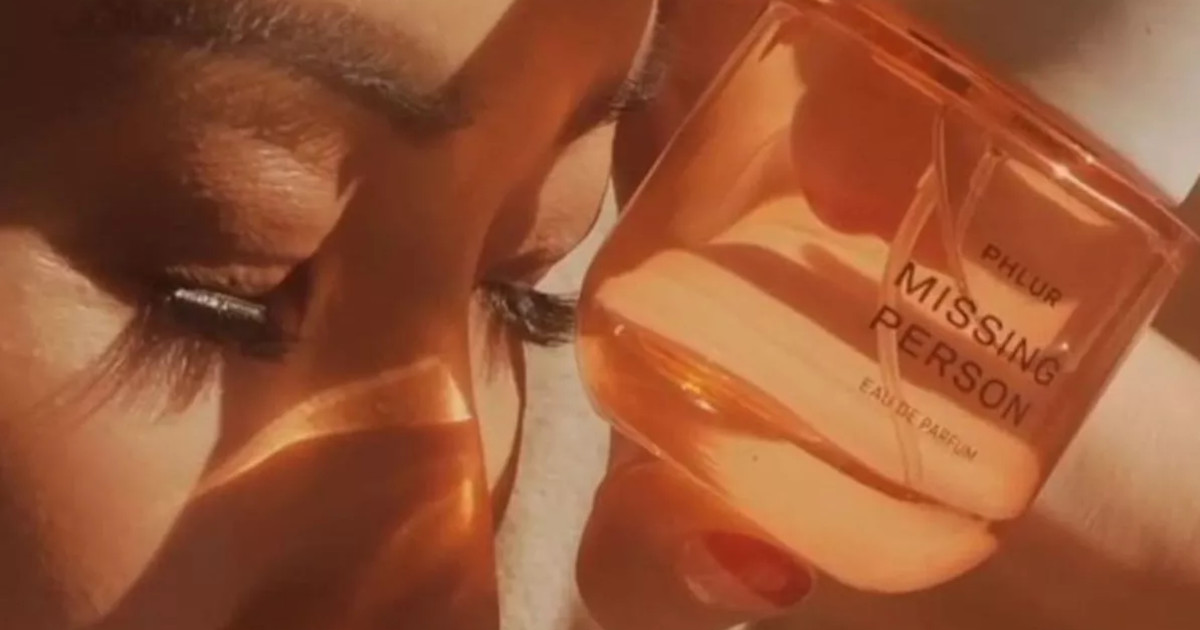Cette publication est également disponible en :
Français
Over the last few weeks, a perfume has been creating a buzz on social media and in the beauty press: Missing Person by Phlur, often described somewhat lazily as “mysterious” in articles about the phenomenon. It apparently boasts a hashtag that has racked up 12 million views on TikTok and a waiting list of over 200,000 customers desperate to get their hands on a bottle of the fragrance whose first batch sold out in a matter of hours. What’s behind the wild enthusiasm? Videos abound showing beauty influencers in tears, almost hysterical, declaring that the perfume instantly reminds them of the mother/husband/friend they have lost, a beloved someone they are missing so badly.
Evoking the bewitching power of Jean-Baptiste Grenouille’s formulas in Patrick Süskind’s Perfume, the message here contains all the elements of a “magic potion” which casts a spell you are powerless to resist. Because everything points to the supernatural, paranormal force of a fragrance that suddenly seems to have inflamed the planet’s entire social media universe.
What the articles do not always mention is that the current owner of Phlur, Chriselle Lim (who bought the brand in 2021, six years after it was founded), herself a powerful influencer with 2.8 million subscribers on TikTok, brilliantly orchestrated this tsunami of tears and pre-orders. If any sorcery is at work, it’s the magic of storytelling, which the 37-year-old American stylist, blogger and businesswoman employs with great deftness. “I think that’s the most powerful tool anyone can use when they’re trying to sell fragrance online,” she explains on allure.com.[1]allure.com/story/chriselle-lim-skin-care-makeup-routine-interview
She reveals in her videos[2]youtube.com/watch?v=qtMfLrswMFo and interviews that she designed the product at a difficult time in her life, when going through a divorce. For example, on Refinery29[3]https://www.refinery29.com/en-us/phlur-missing-person-perfume-review she says “I wanted to bottle something that would smell familiar, taking me back to a time I felt secure.” She insists on the perfume’s universal healing properties, encouraging each person who wears it to release and express the sort of emotions they feel for the people they are missing. With the dramatization of her private life boosting the feeling of identification, she is no doubt making effective use of the mirror effect. But, most importantly, she can count on her vast audience and docile network to spread the word far and wide. The apparently out-of-the-blue “magic” of this success story is actually rooted entirely in the power currently wielded by influencers on social media platforms like TikTok, whose algorithms can exponentially amplify the visibility of a product or content like nothing else. Missing Person did not go viral miraculously, because it smells good and contains pheromones or some other mysterious substance. Everything was put in place to make sure it went viral, and the results were merely the fruit of that construction. Today, influencers no longer drive sales of a product, they design it so they can sell it themselves: “It’s only becoming more common for influencers, particularly those who have been in the business for a long time, to create brands,” observes the site glossy.co.[4] https://www.glossy.co/beauty/exclusive-chriselle-lim-reinvents-clean-fragrance-brand-phlur/
So, you ask, what about the perfume itself? After all these preliminaries, its smell might well seem incidental compared to the context, but it would be wrong not to acknowledge the consistency between the messaging and its olfactory character. Composed by Constance Georges-Picot, a Miami-based perfumer at Cosmo International Fragrances (which very kindly sent us a sample), Missing Person is what we could call a “skin perfume”. Very few top notes (a sprinkling of bergamot and neroli) lead directly into a musky, powdery, creamy sandalwood accord, clean and cosy and very persistent, combining different ingredients that tend to feature in most modern fragrances’ bases as well as in washing detergents, showers gels, shampoos, and so on. In other words, a very familiar, comforting and easy-to-grasp smell – everyone likes musk – but whose formula seems almost incomplete, very concentrated as it is on base notes. With such a consensual profile, it is not hard to understand how it can have a “universal” and immediate effect on TikTokers the world over. But there’s a big gap between this appeal and claiming that it has the power to accurately recall all the loved ones lost by all the people who have smelled it. As Hirac Gurden, neuroscience research director at the CNRS and member of the Nez collective rightly pointed out when interviewed by Libération (in French): “It is absolutely impossible for a single perfume to conjure the presence of someone absent or dead for a maximum number of people. Each human being possesses a unique olfactory signature, made up of a mixture of their body odours, closely linked to metabolism and gender, with a host of artificial smells, like perfume, detergents and food.”[5]liberation.fr/lifestyle/beaute/le-parfum-missing-person-bluff-sentimental-20221130_JKGQ3QA66RDUZNGFYEDV2722EQ/
Delphine de Swardt, also a member of the Nez collective, when questioned by BFMTV for the programme Le Choix d’Angèle (in French)[6]bfmtv.com/replay-emissions/le-choix-d-angele/le-choix-d-angele-200-000-personnes-sur-liste-d-attente-pour-se-procurer-le-parfum-missing-person-de-la-marque-phlur_VN-202212080128.html, cited another aspect that has to be taken into account: “The fact that a fragrance triggers an emotion is unsurprising, since the two circuits are intertwined. But when there’s this much hysteria, I think that dramatization comes into play. This is where we see the limits of today’s social media: since you can’t share the experience of smelling an odour, people need to make up for it by exaggerating the emotion, because that will get them more views and more clicks.” Since perfume generally serves as a good narrative mirror, offering people a great opportunity to talk about themselves, especially with this “missing smell”, the way is open for influencers to make a splash and attract lots of attention.
From an olfactory viewpoint, we’re looking at the lowest common denominator here, which can have a real impact on people without a highly developed olfactory culture. But ultimately it is all about expertly crafted storytelling, telling you exactly what you are going to smell, and an elaborate dramatization, rather than the composition itself. Perfume lovers who are familiar with the market and always in quest of real olfactory emotions risk being disappointed when they smell Missing Person, in aesthetic terms at any rate: as a nice little musky, woody accord, it can of course be perfectly pleasant, but, in my opinion, it is not at all likely to send perfumistas into paroxysms of tears in real life in the same way as on our smartphone screens.
Main visual: © Phlur
Notes








More like missing perfume than missing person.
Judging by your description of the scent, this seems to be the olfactory equivalent of a Rorschach blot.
The sort of indefinite thing that – with no clear form itself – allows the viewer to project into it whatever is lurking in the back of their mind. But, with such a leading name, the subject isn’t being examined psychologically as much as having their personal insecurities manipulated for financial gain.
It doesn’t surprise me that such a shallow thing should arise in a culture like TikTok.